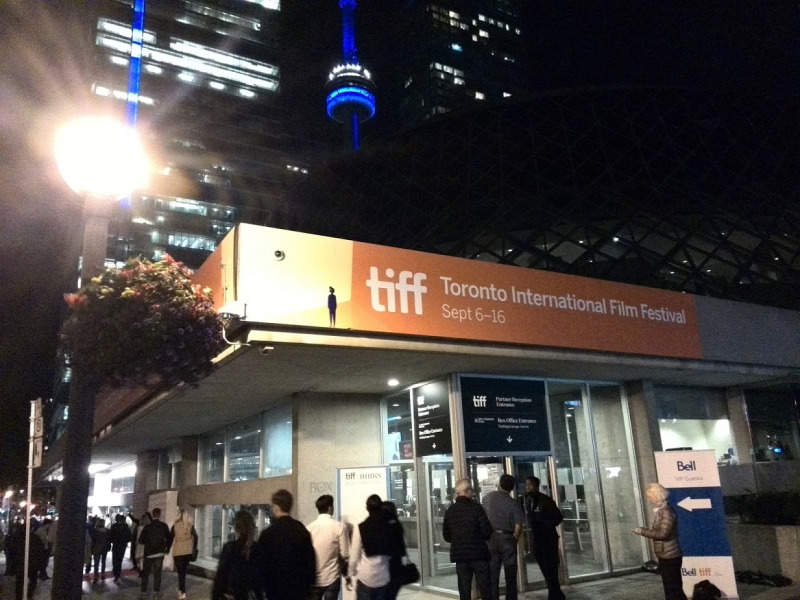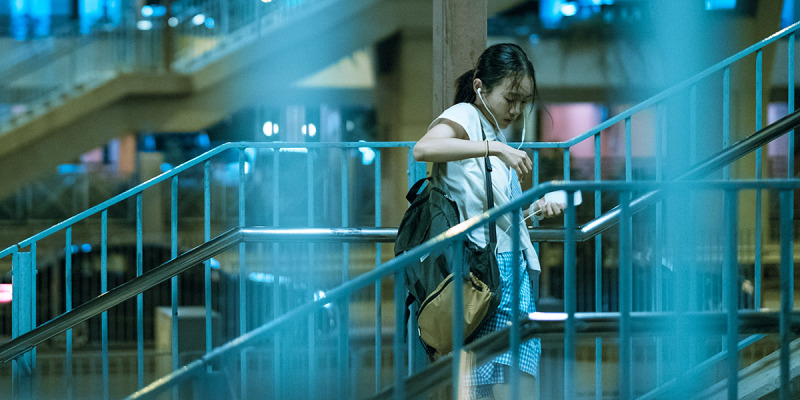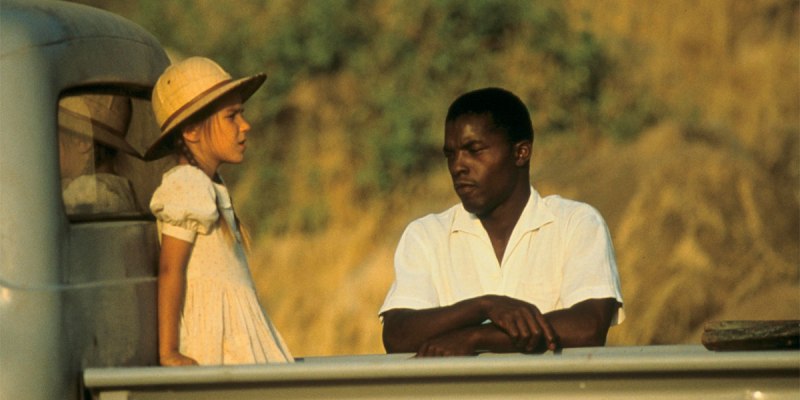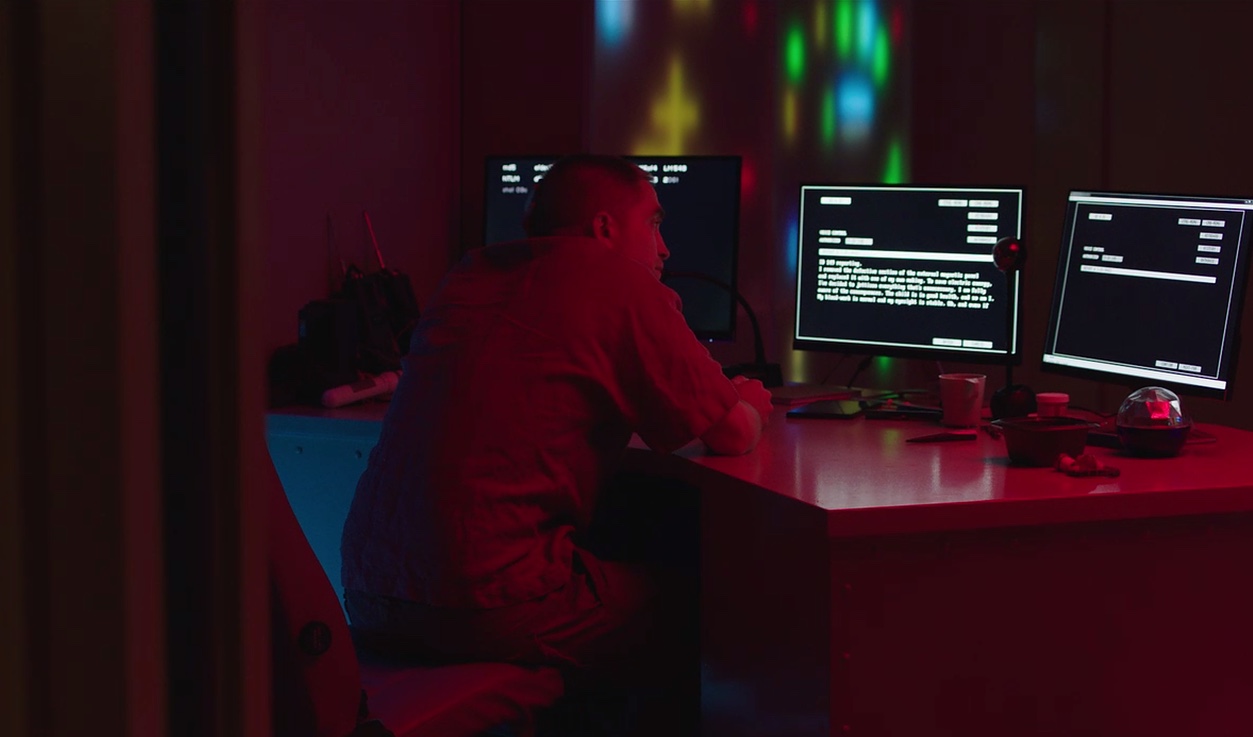During the festival’s opening weekend, TIFF throws a block party on King Street, outside its headquarters at the Lightbox Theatre. Festival Street, as it’s dubbed, is a four day celebration of film, closing part of King Street to vehicle access and opening the space up for foot traffic and easy access to the biggest venues. The Princess of Wales Theatre and Roy Thomson Hall, where the Gala Presentations are held, are both on King Street and form the party’s beating heart.
Walking west from University Avenue, past the huge TIFF sign, you’ll find all sorts of food trucks and kiosks from major festival sponsors, from pop-up French cafés to automobile showcases. King Street’s recent revitalizations have transformed the space into a more pedestrian friendly neighbourhood, with various artistic installations and spaces to rest and relax. Festival Street has taken advantage of this and feels cozier than ever, with people lounging around or beating the heat with a cold drink on one of the many restaurant patios that have that sprawled out onto the street.

The big event this year was the Share Her Journey rally, to promote the recent initiative undertaken by the TIFF Group. Share Her Journey is “a five-year commitment to increasing participation, skills, and opportunities for women behind and in front of the camera.” The rally, held on Festival Street on Saturday, September 8th, saw hundreds of people (and thousands more online) show up to support women in filmmaking and hear from a variety of speakers. Filmmakers Nandita Das and Amma Assante, and actors such as Geena Davis, Amanda Brugel and Mia Kirshner—also the co-founder of #AfterMeToo—were in attendance and spoke to the audience. The speakers discussed strategies for improvement and reform, but inspirational messages were tempered by the reality of the industry’s slow pace of progress—or in some cases, seeming unwillingness to change.
This was underscored most directly and shockingly by the sudden controversy at the festival surrounding Shane Black’s The Predator. While speakers at the Share Her Journey rally were calling for men to stand up and do their part, to support and validate the women they work with, Olivia Munn was being abandoned by her male co-stars. I had only just heard about the film’s deleted scene—Fox removed a scene featuring Munn and Steven Wilder Striegel, a registered sex offender, at the eleventh hour—when I was walking to the theatre for the film’s premiere, but didn’t think much of it at the time. Okay, so they cut him out, and that’s that, right? Well, it was Munn who discovered the fact and was uncomfortable with how everything was being handled, and it was Munn who spoke up and was suddenly finding herself alone at scheduled press interviews here in Toronto. One of her male co-stars apparently walked out of an interview, and for The Hollywood Reporter, Munn showed up entirely alone, nearly fighting back tears to explain why nobody else was there.
How difficult would it really be to show up to a scheduled interview and sit next to Munn? Ignoring everything else, where’s the basic respect, the professionalism? What kind of man can’t even do this?
At what point are movies even worth it?

The core message of the Share Her Journey movement is to lift women up, and that’s work that requires everyone, at every level, and even the smallest of gestures. Credit where credit is due for the TIFF Group, because they’ve been supporting women long before the announcement of their new five-year strategy. TIFF has been seeking out and promoting female voices in cinema for years, pushing the number of female-directed films in their programming up and up, to 35% this year. There’s plenty more work to do, but that’s already more representation than any other film festival in the world. As a regular attendee, I’ve tried to follow the call, seeking out films directed by women at every opportunity. It’s what led me to Rafiki on opening night here at TIFF and to other great films in the past, like Zama and The Rider, which I saw at TIFF last year. And it’s what led me now to The Crossing, the debut feature from Chinese filmmaker Bai Xue.
The Crossing is the opening film for the Discovery program, TIFF’s selection of debut and sophomore features from new filmmakers across the globe. It stars Huang Yao as Peipei, a young girl who crosses the border between China and Hong Kong every day, caught between two worlds. Peipei lives with her mother in China and goes to school and visits her father in Hong Kong. While skipping school one day to go party with friends, she suddenly and randomly winds up involved in smuggling. Not only does she revel in the thrill, she proves surprisingly adept.
The Crossing succeeds on the strength of Huang Yo’s performance and the unique insight it provides into the world of smuggling operations between China and Hong Kong, but I was hoping for a lot more. Keeping the focus on Peipei and the events she experiences is a fine dramatic strategy, but this also allows it to tiptoe around more contentious political issues. There’s a lot more that could have been done with this story, and while Bai Xue directs her actors well, she stumbles a bit developing narrative threads, and a surprising mid-credit scene is just another clumsy stab at symbolism to add to the first ending. The film reminded me of Flora Lau’s Bends, which I saw at TIFF in 2013. It was also a feature debut, and also explores these borders (albeit not smuggling), the only other film I can think of that does, but Lau’s film is more politically charged, more stylistically ambitious, and ultimately more memorable. (I’m still waiting for Lau to make another film.)

There’s one woman in particular that TIFF is celebrating this year, and that’s acclaimed French auteur Claire Denis. One of the greatest film artists of our time (I will fight you to the death if you disagree), Denis has just been announced as the recipient of this year’s Roger Ebert Golden Thumb Award. As part of the Festival Street activities, TIFF is also hosting some free outdoor screenings, and among them is Denis’s first film, Chocolat, which is celebrating its 30th anniversary. The TIFF Cinematheque owns a 35mm print of the film, which I have been fortunate enough to see screened before. It’s a revelation of a film, powerful and fully-formed in the way debuts typically aren’t, beautiful and rich in symbolism. It helped put Isaach De Bankolé on the map, and for good reason.
But the main event is the red carpet Gala premiere of Denis’s newest film, High Life. Denis is no stranger to genre; her 2001 horror film, Trouble Every Day, has been screened repeatedly as part of TIFF’s year-round programming, and it’s always worth catching again and again. I derive a sort of sick pleasure in witnessing new audiences experience the profoundly disturbing journey of that film for the first time. High Life is still a first, however, as Denis has never tackled a science-fiction film before. And in doing so, she has crafted one of the most fearsome, ferocious, muscular and uncompromising works of her career.

High Life is clumsy at times, stilted and bewildering at others, owing in part perhaps to it being her first English-language production. But as it builds, it overwhelms, and exposition finally gives way to one of the most fractured, baffling and astonishing movie experiences of the year. I’ve already heard people calling it divisive. Throwing Denis at the Gala audience was certainly a bold move; let’s just say, a lot of people didn’t stick around. Denis’s cinema, in the words of TIFF co-head Cameron Bailey, who introduced the film last night, is free. It never conforms to expectations. It’s singular and unapologetic, and it doesn’t give a fuck. Denis, speaking of one of the production partners on the film, claimed the man hated her. But, she added, who cares? That’s the kind of attitude that casts heartthrob Robert Pattinson in a science-fiction film, and then turns in a finished product that makes Trouble Every Day look quaint, and causes the most audience walkouts I’ve seen during TIFF since Albert Serra’s Birdsong in 2008. Coincidentally, both great films!
I couldn’t possibly unpack the film after a single viewing, but I’m going to write something, because this madness is nothing if not inspiring. Look for my full review of High Life later in the week. Check back all week for more festival dispatches—and go read Dispatch #1 and Dispatch #2 for my perspectives. Opening weekend will fast become a distant memory, but there’s still a full week of films rushing up to meet us, and I’ve still got a world premiere from another of my favorites, Mia Hansen-Løve, coming up.
The 43rd Toronto International Film Festival runs from September 6th to 16th, 2018.

3 comments